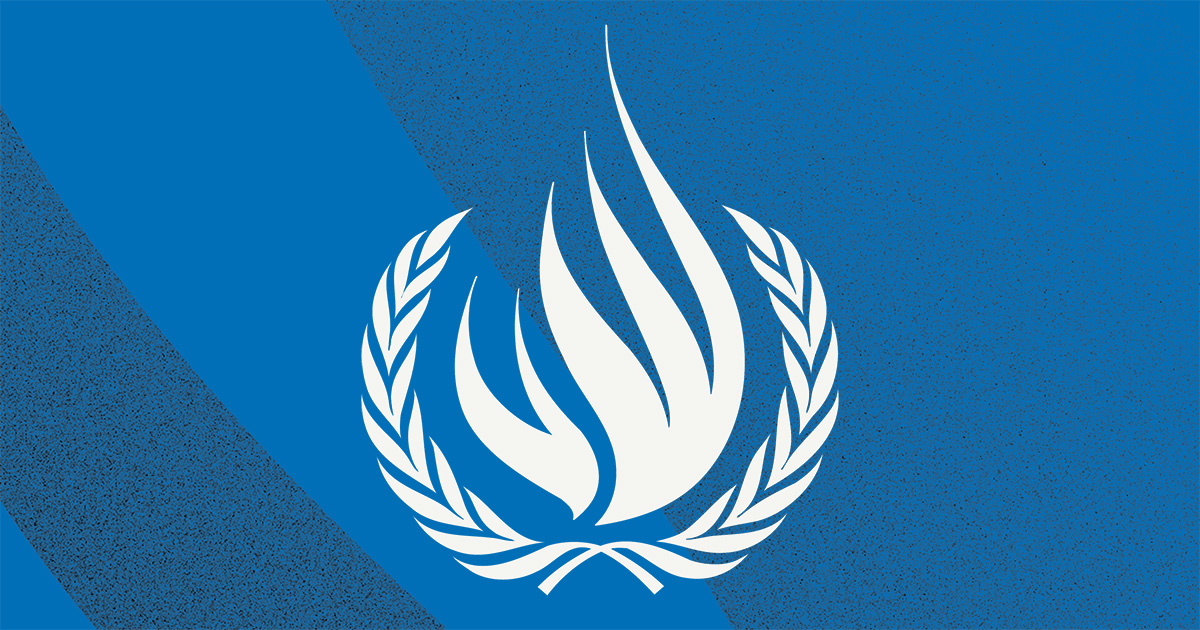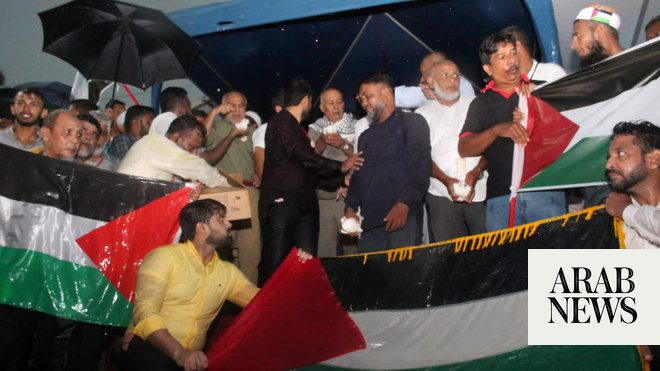
GENEVA (8 December 2023) – Member States of the United Nations must use all measures at their disposal and their influence to promote an immediate and permanent ceasefire in Gaza, UN human rights experts* said, issuing a clarion call for peace ahead of a crucial Security Council vote in New York today.
“UN Member States must mobilise now and act collectively to save Gaza from total destruction and mass mortality, in order to preserve the raison d’être of the United Nations,” the experts said. “Member states must act at the Security Council or the General Assembly as applicable, to push for a permanent ceasefire in Gaza,” they said.
The UN experts welcomed Secretary-General Antonio Guterres’ letter to the UN Security Council, based on Article 99 of the United Nations Charter, calling on the Council to take urgent action to avert a total collapse of public order and the humanitarian system in Gaza.
“We extend our fullest support to Secretary-General Guterres, as he assumes greater leadership in the effort to end the humanitarian catastrophe unfolding in Gaza,” the experts said.
UN humanitarian agencies sounded the alarm this week that the situation in Gaza was ‘apocalyptic.’
The experts deplored the collapse of the temporary humanitarian ceasefire and the resumption of Israel’s large-scale military operations in Gaza on 1 December. Over the past seven days, Israeli bombardment has killed more than 2,000 Palestinians, increasing the total number of Palestinian fatalities since the start of hostilities to above 17,000. Seventy percent of those killed in the violence are reportedly women and children. Relentless military operations and ever-expanding evacuation orders have displaced 85 percent of Gaza’s population. “These actions could possibly amount to the forcible transfer of a population – a crime against humanity,” the experts said.
The Israeli military’s massive bombardment, in a manner inconsistent with international humanitarian law, has not spared hospitals, schools, refugee camps, residential buildings, markets and religious establishments, where civilians should be safe and protected from indiscriminate and disproportionate attacks. The experts expressed alarm that the entry and provision of humanitarian aid has dwindled since the resumption of hostilities, due to shortages in basic supplies, lack of fuel, disrupted communications, movement restrictions and severe insecurity in the besieged Gaza strip. They suggested that such actions could be tantamount to collective punishment, which is prohibited under international humanitarian law.
“In the short term, a ceasefire is an essential precondition for urgently stabilising the humanitarian situation in Gaza. To ensure the basic safety and needs of the civilian population, especially women and children in Gaza in the longer term, consultations and preparations must now be launched towards the deployment of an international protective presence in the entire Occupied Palestinian Territory under the supervision of the UN,” the experts said. They called for the support and inclusion of Palestinian civil society, as an integral part of any decision-making to ensure the needs of affected communities are taken into account.
“UN Member States must do all that they can to end the epic suffering in Gaza and restore international peace and security, before we reach a point of no-return,” the experts warned.
They reiterated their previous statement warning against the commission of genocide and their recommendations:
Allow unimpeded delivery of desperately needed humanitarian aid to the people in Gaza, including reproductive health supplies;
Ensure the immediate, unconditional, safe and secure release of the hostages taken by Hamas;
Ensure that all Palestinians arbitrarily detained by Israel are released immediately;
Ensure that all persons, including women and girls, are protected from gender-based violence, including sexual assault and abuse. Allegations of such crimes must be fully and independently investigated;
Ensure that pregnant women have access to adequate health care;
Open humanitarian corridors toward the West Bank, east Jerusalem and Israel, especially for those that have been most affected by this war, the sick and wounded, persons with disabilities, older persons, pregnant women and children;
Collaboration of all parties with the Commission of Inquiry on the Occupied Palestinian Territory, including East Jerusalem, and Israel, and the Prosecutor of the International Criminal Court on the investigation opened in March 2021, as well as crimes arising from the recent events, underlining that the crimes committed today are partly due to a lack of deterrence and continued impunity;
Implement an arms embargo on all warring parties; and
Address the underlying causes of the conflict by ending the Israeli occupation of the Palestinian territory and fulfilling the Palestinian right of self-determination.
* The experts: Ms. Francesca Albanese, Special Rapporteur on the situation of human rights in the Palestinian Territory occupied since 1967; Reem Alsalem, Special Rapporteur on violence against women and girls, its causes and consequences; Mr. Pedro Arrojo Agudo, Special Rapporteur on the human rights to safe drinking water and sanitation; Ms. Cecilia Bailliet, Independent Expert on human rights and international solidarity; Mr. Balakrishnan Rajagopal, Special Rapporteur on the right to adequate housing; Aua Baldé (Chair-Rapporteur), Gabriella Citroni (Vice-Chair), Angkhana Neelapaijit, Grażyna Baranowska, Ana Lorena Delgadillo Perez, Working Group on enforced or involuntary disappearances; Mr. David Boyd, Special Rapporteur on the issue of human rights obligations relating to the enjoyment of a safe, clean, healthy and sustainable environment; Ms. Beatriz Miranda Galarza, Special Rapporteur on the elimination of discrimination against persons affected by leprosy and their family members; Mr. Surya Deva, Special Rapporteur on the right to development; Barbara G. Reynolds (Chair), Bina D’Costa, Dominique Day, Catherine Namakula, Working Group of Experts on People of African Descent; Dorothy Estrada Tanck (Chair), Claudia Flores, Ivana Krstić, Haina Lu, and Laura Nyirinkindi, Working group on discrimination against women and girls; Mr. Michael Fakhri, Special Rapporteur on the right to food; Ms. Paula Gaviria Betancur, Special Rapporteur on the human rights of internally displaced persons; Ms Ashwini K.P. Special Rapporteur on contemporary forms of racism, racial discrimination, xenophobia and related intolerance; Irene Khan, Special Rapporteur on the protection and promotion of freedom of opinion and expression; Ms. Mary Lawlor, Special Rapporteur on the situation of human rights defenders; Ms. Claudia Mahler, Independent Expert on the enjoyment of all human rights by older persons; Mr. Clément Nyaletsossi Voule, Special rapporteur on the rights to freedom of peaceful assembly and of association; Ms. Tlaleng Mofokeng, Special Rapporteur on the right of everyone to the enjoyment of the highest attainable standard of physical and mental health; Ms. Siobhán Mullally, Special Rapporteur on trafficking in persons, especially women and children; Mr. Tomoya Obokata, Special Rapporteur on contemporary forms of slavery, including its causes and consequences; Ms. Margaret Satterthwaite, Special Rapporteur on the Independence of Judges and Lawyers; Mr. Ben Saul, Special Rapporteur on the promotion and protection of human rights and fundamental freedoms while countering terrorism; Ms. Farida Shaheed, Special Rapporteur on the right to education; Ms. Alexandra Xanthaki, Special Rapporteur in the field of cultural rights; Carlos Salazar Couto (Chair-Rapporteur), Sorcha MacLeod, Jovana Jezdimirovic Ranito, Chris M. A. Kwaja, Ravindran Daniel, Working Group on the use of mercenaries; Ms Attiya Waris, Independent Expert on the effects of foreign debt and other related international financial obligations of States on the full enjoyment of all human rights, particularly economic, social and cultural rights; Mr Olivier De Schutter, Special Rapporteur on extreme poverty and human rights; Mr Graeme Reid, Independent Expert on Protection against violence and discrimination based on sexual orientation and gender identity; Francisco Cali Tzay, Special Rapporteur on the rights of indigenous peoples.
Special Rapporteurs, Independent experts and Working Groups are part of what is known as the Special Procedures of the Human Rights Council. Special Procedures, the largest body of independent experts in the UN human rights system, is the general name of the Council’s independent fact-finding and monitoring mechanisms. Special Procedures mandate-holders are independent human rights experts appointed by the Human Rights Council to address either specific country situations or thematic issues in all parts of the world. Special Procedures experts work on a voluntary basis; they are not UN staff and do not receive a salary for their work. They are independent of any government or organisation and serve in their individual capacity.
For additional information and media requests, please contact hrc-sr-opt@un.org.
For media enquiries regarding other UN independent experts, please contact Dharisha Indraguptha (dharisha.indraguptha@un.org)
Follow news related to the UN"s independent human rights experts on Twitter: @UN_SPExperts
Concerned about the world we live in?
Then stand up for someone"s rights today.
#Standup4humanrights and visit the website at
http://www.standup4humanrights.org
Situation in the Occupied Palestinian Territory and Israel
See all Media coverage of the situation









